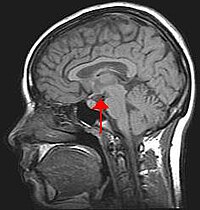
Photo from wikipedia
ABSTRACT Circadian preferences have been associated with mental health as well as social and physical health in recent years. However, factors associated with circadian preferences have not been fully elucidated.… Click to show full abstract
ABSTRACT Circadian preferences have been associated with mental health as well as social and physical health in recent years. However, factors associated with circadian preferences have not been fully elucidated. The main aim of this study is to investigate the associations of childhood trauma and attachment styles with circadian preferences. A total of 673 participants were evaluated using the Morningness–Eveningness Questionnaire (MEQ), the Childhood Trauma Questionnaire 28 (CTQ-28), and the Experiences in Close Relationships-Revised (ECR-R) questionnaire. The results indicated that 14.9% (n = 100) of the participants were morning type, 20.6% (n = 139) were evening type, and 64.5% (n = 434) were intermediate type. Both childhood trauma and attachment-related anxiety/avoidance scores were associated with being evening type (p < .01). Moreover, attachment-related anxiety and avoidance fully mediated the association between childhood trauma and circadian preferences. The present study showed that attachment styles might be associated with circadian preferences. Further studies are needed to replicate these results and to infer explanatory mechanisms for these cross-sectional associations.
Journal Title: Chronobiology International
Year Published: 2022
Link to full text (if available)
Share on Social Media: Sign Up to like & get
recommendations!